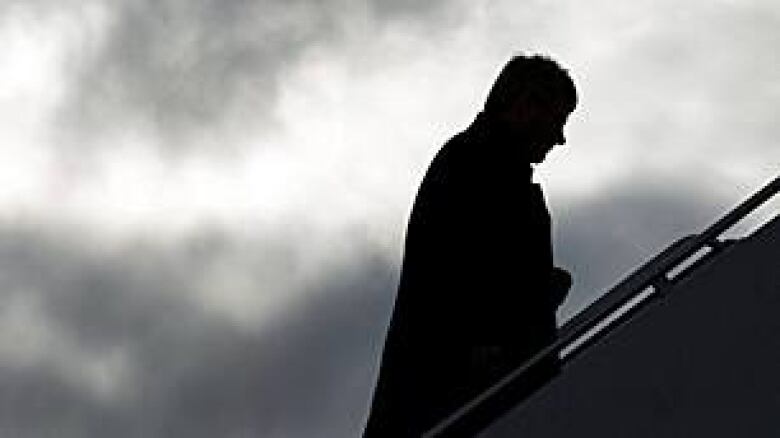Karzai hopes to reassure NATO leaders
Harper leaves for meeting in Lisbon
Afghan President Hamid Karzai will try to reassure NATO leaders, including Prime Minister Stephen Harper,that his country is fully committed to a security handover by 2014.
Karzai will join the 28 NATO leaders in Lisbon this weekend but he faces a rough reception after calling recently for an end to night raids and other combat operations by American-led forces in his country.
Those comments in a Washington Post interview exacerbated Karzai's increasingly strained relations with Western partners in the run-up to Lisbon. U.S. Gen. David Petraeus, who commands NATO-led forces in Afghanistan, has viewed Karzai's remarks as a direct challenge to his counter-insurgency strategy, setting the stage for a potentially nasty sideshow in Lisbon.

Harper departed Thursday for Lisbon, where Canadian officials said he would be seeking assurances from Karzai after extending military operations in Afghanistan to 2014.
"I think the message that President Karzai will hear, given that we've been engaged in Afghanistan for a long time, is that we will remain engaged but we certainly expect the Afghans to do their share of the work," said a senior Canadian government official before Harper's departure.
Harper announced this week that the Canadian Forces would deploy 950 military trainers in strictly non-combat operations to March 2014. The troops will be based in and around Kabul, as the announcement ended months of speculation about the future of the Canadian military in Afghanistan after the July 2011 deadline set by Parliament for withdrawal from Kandahar.
Harper's office could not say whether he would hold a formal bilateral discussion with Karzai, but the Canadian official suggested the Afghan leader needed to reach out to his NATO counterparts.
"They will expect President Karzai to make a very strong commitment to the transition," he said.
"They will also want to hear him on the transition leading to 2014, how that is actually unfolding and support that."
Afghanistan's ambassador to Canada said it is entirely fair for NATO leaders to seek those assurances from Karzai.
"It goes without saying that without the Afghans doing their share, there will be no transition. It's absolutely predicated on that," Afghan envoy Jawed Ludin told The Canadian Press in an interview.
Ludin said it is also worth remembering that Karzai himself suggested the 2014 time frame for handing security responsibility over to his country and drawing down foreign troops.
"His [Karzai's] ability and the ability of the Afghan government to be prepared to take over responsibility will also depend on the extent to which the international community supports the training and development efforts," said Ludin, a former chief of staff to Karzai before his posting to Ottawa.
Agrees with 'thrust' of comments
NATO Secretary General Anders Fogh Rasmussen said this week that he agreed with the "thrust" of Karzai's comments moving toward "greater Afghan leadership of military operations and transition to a supporting role for international forces."
But Rasmussen signalled he is growing weary of Karzai's frequent clashes with the West.
"Of course, I can't say that I agree with everything President Karzai has stated on all issues, but we also have to accept that he is the elected president of the country, and of course, he can express his views as he wishes."
Harper and his fellow 27 NATO leaders will be joined by 20 other allies in two days of meetings that will include a discussion of the alliance's exit strategy for Afghanistan.
Canada will send military trainers to Afghanistan until March 2014, at which time the NATO-led mission hopes to begin scaling back its military contribution.
The U.S. is expected to announce its phased transition of security duties to Afghan forces by 2014 in Lisbon.
That transition will begin early next year and extend to the end of 2014, across Afghanistan's 34 provinces, said Doug Lute, U.S. President Barack Obama's special assistant for Afghanistan and Pakistan.
Lute said that as that process unfolds, NATO countries will have to "reassure the Afghans that as they stand up, they will not have to stand alone."
Lute also said this week that Canada's training announcement puts it at "the forefront of the overall transition in the mission over the coming years" and is central to enabling Afghan security forces to take the lead in protecting their country.
NATO leaders will also unveil their new strategic concept the alliance's master plan for operating in a world beset by cyber terror and rogue states pursuing nuclear weapons.
Harper will be accompanied by Foreign Affairs Minister Lawrence Cannon, Defence Minister Peter MacKay and Gen. Walt Natynczyk, the chief of the defence staff.
Russian President Dmitry Medvedev will also attend the summit in an attempt to reset rocky relations with NATO.












_(720p).jpg)


 OFFICIAL HD MUSIC VIDEO.jpg)
.jpg)



























































































